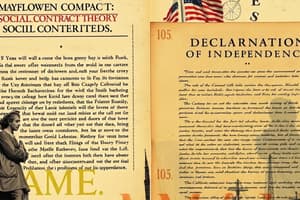Podcast
Questions and Answers
What theory does the Declaration of Independence support regarding government?
What theory does the Declaration of Independence support regarding government?
- Government exists without the consent of the people
- Social contract theory requires consent of the governed (correct)
- Citizens cannot abolish destructive government
- Government should have unlimited power
The Articles of Confederation allowed for taxation.
The Articles of Confederation allowed for taxation.
False (B)
What significant event demonstrated the weaknesses of the Articles of Confederation?
What significant event demonstrated the weaknesses of the Articles of Confederation?
Shay's Rebellion
The Constitution provides for ___ sections of Congress.
The Constitution provides for ___ sections of Congress.
What is the minimum age requirement to be a Senator according to the Constitution?
What is the minimum age requirement to be a Senator according to the Constitution?
Which of the following is a power that the President has?
Which of the following is a power that the President has?
What is the purpose of the Necessary and Proper Clause in the Constitution?
What is the purpose of the Necessary and Proper Clause in the Constitution?
Brutus I supports the idea of a strong centralized federal government.
Brutus I supports the idea of a strong centralized federal government.
According to Federalist 10, the solution to the problem of factions is ___ democracy.
According to Federalist 10, the solution to the problem of factions is ___ democracy.
What is necessary for an amendment to be proposed?
What is necessary for an amendment to be proposed?
Flashcards are hidden until you start studying
Study Notes
Declaration of Independence
- Introduces social contract theory emphasizing consent of the governed.
- Asserts people's right to abolish a destructive government.
- Lists unalienable rights: life, liberty, and property, highlighting government’s role in protecting these rights.
- Grievances include:
- Taxation without representation
- Quartering troops
- Trial without jury
- Dissolution of representative governing bodies
- Control over judges
Articles of Confederation
- Served as the first governing document of the U.S.
- Established equal representation in a unicameral Congress.
- Achievements include the Northwest Ordinance for territory governance.
- Notable weaknesses:
- Inability to tax or regulate interstate commerce.
- No executive or judicial branch.
- Requirement of 9 out of 13 states to pass laws and unanimous consent for amendments.
- Limited congressional powers include:
- Borrowing money
- Declaring war
- Signing treaties
- Creating a national army (unpaid).
The Constitution
- Structured into articles outlining the framework of government.
- Article 1 details legislative powers:
- Congress is bicameral: House (2-year terms, 25 years old, 7 years a citizen) and Senate (6-year terms, 30 years old, 9 years a citizen).
- Speaker of the House and Vice President preside over respective chambers.
- Both chambers involved in impeachment—House impeaches with a simple majority, Senate conducts trial with a supermajority.
- Key powers of Congress include taxation, military funding, and regulating commerce, all underlined by the Necessary & Proper (Elastic) Clause.
- Article 2 outlines the executive branch, including presidential powers, qualifications (4-year terms, born U.S. citizen, resident for 14 years, at least 35 years old), and cabinet formation.
- Article 3 establishes the judiciary, including the Supreme Court with lifetime appointments.
- Article 5 details the amendment process, allowing either congressional proposal or state convention for amendments.
- Article 6 includes the Supremacy Clause, establishing federal law as the supreme law of the land.
Fed 10
- Discusses inevitability of factions and their control in a representative democracy.
- Argues against eliminating freedoms to cure faction issues.
- Promotes pluralism where diverse groups compete for power, moderating faction influence.
- Emphasizes federalism to manage faction control across state and national levels.
Brutus I
- A persuasive essay against the ratification of the Constitution.
- Critiques the Necessary and Proper and Supremacy Clauses for granting immense federal power.
- Claims representatives in a large republic are disconnected from the populace.
- Condemns extensive federal taxing power as a means to expand government authority.
Studying That Suits You
Use AI to generate personalized quizzes and flashcards to suit your learning preferences.




